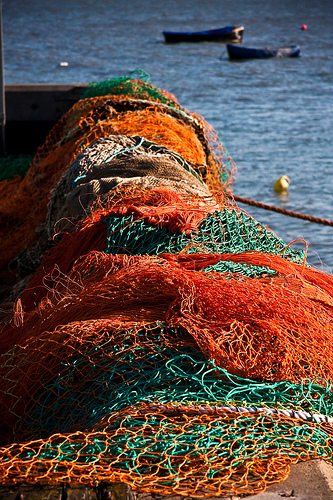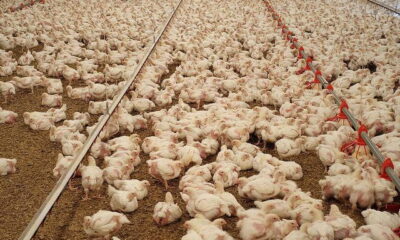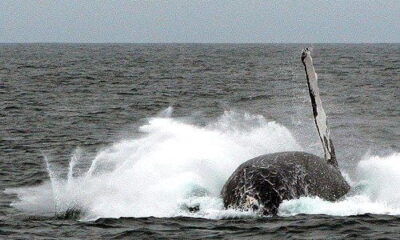

Economy
Global experts gather to tackle the growing issue of “ghost” fishing gear in oceans
Lost and abandoned fishing gear is causing irreparable damage to the world’s oceans. Experts from around the world will meet in London today to launch the Global Ghost Gear Initiative (GGGI), marking the start of an action plan to tackle this urgent problem.
The GGGI, driven by World Animal Protection, has brought together leading experts, including the United Nations Environment Programme, the Marine Stewardship Council, Young’s Seafood Limited and Australia’s Northern Prawn Fishery to share their knowledge and expertise to ensure safer, cleaner oceans.
Here is short one minute video or a slightly longer one with a bit more in depth on the projects.
Lost and abandoned fishing gear, also known as ’ghost gear’, poses a significant threat to the health and productivity of our oceans. Each year sees the appearance of new ghost gear due to factors such as extreme weather events, accidental loss or deliberate disposal at sea. Mostly made of plastic with a life expectancy of up to 600 years, ghost gear accumulates in our oceans at an estimated rate of 640,000 tonnes per year or one tonne of ghost gear per 125 tonnes of fish caught. This causes huge devastation to marine habitats as it continues to catch, entangle and kill hundreds of species including seals, turtles, dolphins and whales.
The growing volume of ghost gear and lack of a global solution puts a strain on the livelihoods of coastal communities and productivity of the fishing industry. For example, the loss of marketable lobster due to ghost fishing gear is estimated to lead to a global loss of US$250 million per year.
David Parker, Marine Biologist, Young’s Seafood Limited, UK, said: “We recognise that ghost gear poses a significant yet hidden threat to both the seafood industry and the wider marine environment; affecting fishermen, other marine users and wildlife. Young’s aims to bring a seafood industry perspective to the GGGI through the network of our supply chains around the world.” Mike Mitchell, CSR and Technical Director at Young’s Seafood Limited, added: “As a leading processor of responsibly sourced fish we are delighted to be involved in this ground-breaking initiative, seeking to tackle one of the great unresolved issues in seafood sustainability, on a global scale. We’re pleased to be taking a hands-on role in this, drawing on the expertise of our Marine Biologist, as part of our Fish for Life programme on responsible sourcing.”
Petri Suuronen, Fishery Industry Officer, Food and Agriculture Organization (FAO) of the United Nation’s Fishing and Operations Service, said: “This global problem requires a global solution and FAO supports the GGGI’s mission and collaborative approach to ensure safer, cleaner oceans. We encourage the active participation of the fishing industry in this initiative.”
In parts of the world, local communities, organisations and governments have combined their efforts to address this problem at a local level; this collaboration provides us with a glimpse of the scale of this issue, and the positive impact that collective action can bring.
In the US, World Animal Protection and the Gulf of Maine Lobster Foundation recently teamed up with local fishermen to remove ghost gear from Maine waters. Some 147 derelict traps as well as 1,000 pounds of rope and line were removed in total. Ghost gear that could not be reused was recycled into electricity by the Fishing for Energy programme.
Mike Baker, Chief Executive of World Animal Protection, said: “Ghost gear is an under reported problem that is killing the animals of our world’s oceans. The loss of fishing gear needs to be better quantified, monitored and ultimately prevented.
“We are very proud of the GGGI, and by uniting global efforts we hope to move towards a future where ghost gear no longer poses an ever-growing threat to our oceans or the animals that live in them.”
Visit www.ghostgear.org for more details or follow their Twitter campaign using #ghostgear


 Environment12 months ago
Environment12 months agoAre Polymer Banknotes: an Eco-Friendly Trend or a Groundswell?

 Features11 months ago
Features11 months agoEco-Friendly Cryptocurrencies: Sustainable Investment Choices

 Features12 months ago
Features12 months agoEco-Friendly Crypto Traders Must Find the Right Exchange

 Energy11 months ago
Energy11 months agoThe Growing Role of Solar Panels in Ireland’s Energy Future




























